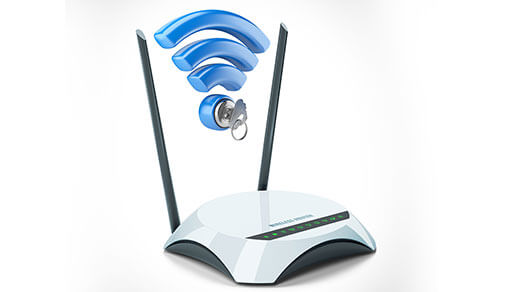Things In Your Home That Interfere With And Block Wi-Fi Signals
Thursday, Sep 12, 2024 · 20 mins
337

In today's digital age, Wi-Fi has become a necessity in our homes. From streaming movies to video calls, a strong and reliable Wi-Fi signal is crucial for our everyday activities. However, there are certain things in our homes that can interfere with and block Wi-Fi signals, causing frustration and disruptions to our online experience. In this article, we will explore some common culprits that may be affecting your Wi-Fi signal and how you can address these issues to improve your connection.
One of the most frustrating things that can happen when you're trying to connect to Wi-Fi is experiencing a weak or spotty signal. This can be caused by a variety of factors, including interference from other electronic devices, thick walls, and even certain objects within your home that can block Wi-Fi signals.
Common Culprits:
1. Electronic Devices: The electromagnetic waves emitted by your microwave oven can interfere with Wi-Fi signals, especially if your router is located close to the kitchen. One common culprit for interfering with Wi-Fi signals is electronic devices. Items such as cordless phones, baby monitors, and even microwave ovens can emit signals that disrupt the Wi-Fi frequency. To improve your Wi-Fi connection, try moving these devices away from your router or connecting to the 5GHz band, which is less crowded than the 2.4GHz band.
2. Metal Objects: Metal objects such as mirrors, filing cabinets, and metal furniture can reflect and block Wi-Fi signals. Water and mirrors are known to reflect and absorb Wi-Fi signals, leading to reduced coverage in certain areas of your home. If you have a fish tank or large mirror near your router, try relocating them to improve your Wi-Fi signal strength. Additionally, avoid placing your router in close proximity to bathrooms or kitchens where water is present. If you notice a weak signal in a room with a lot of metal objects, try repositioning your router or consider using a long distance wifi extender to boost the signal.
3. Thick Walls: Thick walls made of concrete or brick can obstruct Wi-Fi signals, causing weak or intermittent connectivity. To improve signal strength, try positioning your router in a central location or investing in a mesh Wi-Fi system that can distribute the signal more evenly throughout your home.
4. Cordless Phones: Older cordless phones operate on the same frequency as Wi-Fi routers, which can lead to interference and signal degradation. If you're experiencing connectivity issues, consider switching to a newer model of cordless phone that operates on a different frequency.
5. 802.11b Devices: Older devices that use the 802.11b standard can slow down your Wi-Fi network, even if you have a modern router. Consider upgrading these devices to newer models that support the 802.11n or 802.11ac standards for faster and more reliable connections.
6. Interference from Neighbors' Wi-Fi Networks: If you live in close proximity to neighbors, their Wi-Fi networks could be interfering with your own signal. To minimize this interference, try changing the channel on your router to a less crowded frequency. Additionally, consider using a Wi-Fi analyzer tool to identify the least congested channels in your area.
How to Improve Your Wi-Fi Signal:
1. Conduct a Wifi Speed Test: Before implementing any changes, it's essential to determine your current internet speed. You can easily conduct a wifi speed test using various online tools available. This will help you identify areas where your connection is weak and where interference may be occurring.
2. Invest in a Wifi Signal Booster: One of the most effective ways to improve your Wi-Fi signals is by investing in a wifi signal booster. These devices work by amplifying the existing signals from your router, extending their range and reducing interference. Wifi signal boosters come in various forms, including plug-in extenders, external antennas, and mesh networking systems. If you have a large home or office space, consider using long distance wifi extenders to boost the signal strength in areas with weak coverage. Long distance wifi extenders can help eliminate dead zones and improve overall connectivity.
3. Bluetooth affects WiFi: If you have multiple Bluetooth devices in your home, they could be causing interference with your Wi-Fi signals. To minimise this interference, try keeping your Bluetooth devices away from your router or consider using devices that operate on different frequencies. Additionally, turning off Bluetooth devices when not in use can help improve your Wi-Fi connection because Bluetooth affects WiFi.
4. Optimise Wifi Router Installation: Proper wifi router installation can significantly impact your internet connection. To ensure optimal performance, place your router in a central location, away from walls and obstructions. Avoid placing it near other electronic devices that could cause interference. Additionally, consider adjusting the router's antennas to improve signal strength in different directions.
5. Upgrade Your Router: If you have an older Wi-Fi router, consider upgrading to a newer model that supports the latest Wi-Fi standards. This can improve the overall performance and coverage of your network.
6. Reduce Interference: To minimise interference from other devices, make sure to keep your router away from cordless phones, Bluetooth devices, and other electronics that operate on the same frequency as Wi-Fi.
7. Change Wi-Fi Channels: Sometimes, switching to a different Wi-Fi channel can help reduce interference from neighbouring networks. You can use a Wi-Fi analyzer tool to determine the best channel for your network.
8. Update Firmware: Regularly updating the firmware of your router can fix bugs and improve its performance. Check for firmware updates on the manufacturer's website and install them as needed.
Conclusion:
A strong and reliable Wi-Fi signal is essential for our daily lives, and understanding the factors that can interfere with and block Wi-Fi signals is key to maintaining a seamless online experience. By identifying and addressing common culprits such as microwaves, metal objects, and thick walls, you can improve your Wi-Fi connectivity and enjoy faster speeds and more reliable connections. Remember to position your router strategically, update your devices, and limit interference to ensure optimal performance from your Wi-Fi network.
Be Part Of Our Network
All Categories
- BUSINESS INTERNET
- Router
- Internet Security
- Wi-Fi Connection
- Wi-Fi Network
- Internet Broadband
- smartfiber
- Internet Speed
- TV Streaming
- Wifi Connection
- BEST BROADBAND PLANS
- BROADBAND PLANS | 5GHz
- 2.4GHz
- 5GHz frequency
- 5GHz WiFi frequency
- 2.4GHz frequency
- LDRs
- LONG DISTANCE RELATIONSHIP
- ACT Fibernet
- wifi as a service
RECENT ARTICLES

Find the perfect internet plan for you!

















